Fall School
Learning Resource Centre UCY Library “Stelios Ioannou”,
UCY Council-Senate Building “Anastasios G. Leventis”,
MBA Building and Department of Psychology Building
University New Campus / Nicosia
03-06 October 2019
Subject: Fall School of the Neo-PRISM-C MARIE SKŁODOWSKA-CURIE INNOVATIVE TRAINING NETWORK (ITN), Grant Agreement No. 813546
We are pleased to welcome you all to the Fall School of the Neo-PRISM-C Project, to be held at the University of Cyprus New Campus, in Nicosia (Cyprus), on October 03-06, 2019. We are looking forward to seeing you all in Cyprus; Please make sure that you register through the website for this wonderful event!
Meeting hours: 09:00-18:30 (including coffee / refreshment breaks and lunch)
Keynote Speakers
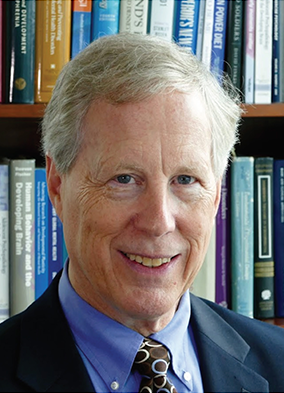
Bruce Cuthbert
National Institute of Mental Health (NIMH)
Dr. Bruce Cuthbert directs the Research Domain Criteria (RDoC) Unit at the National Institute of Mental Health, which leads NIMH’s development of a research framework for psychopathology based upon dimensions of behavior and neural systems. He also served as NIMH Acting Director from 2015 to 2016. Dr. Cuthbert has led the RDoC project since its inception in 2009, also leading the Division of Adult Translational Research from 2009-2014. He returned to NIMH in 2009 following four years as a professor at the University of Minnesota, and was previously Chief of the NIMH Adult Psychopathology Branch. Prior to joining NIMH he served for eleven years as an investigator in the US Army studying combat-related stress and biological rhythms, and for seventeen years on the faculty at the University of Florida. Dr. Cuthbert received his Ph.D. in clinical psychology and psychophysiology from the University of Wisconsin, and is known for his translational research on emotions and anxiety disorders. He is a fellow of the Association for Psychological Science and a past-president of the Society for Psychophysiological Research.
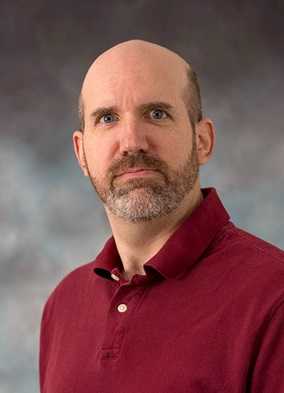
Christopher Bartlett
Research Institute at Nationwide Children’s Hospital at the Ohio State University (NCH)
Christopher Bartlett, Ph.D. is Associate Professor of Pediatrics and Mathematical Medicine at the Research Institute at Nationwide Children’s Hospital at the The Ohio State University, in USA. His long-term goal is to understand the molecular neurobiology of human language. However, moreso than any other cognitive neuroscience topic, the neurobiology of language is quite resistant to use of animal models except in extremely circumscribed ways. Christopher’s approach is to use “forward genetics” whereby we map language and related traits into the human genome in language impaired patient and family studies using a mix of statistics and genomics. This work entails three levels of basic research and experimentation that feed into the larger project. 1) Statistical genetics research where we develop the statistical methods necessary to directly model and thereby answer our specific research questions. This work involves both analytical and computational methods. 2) Molecular genetic methods and assay development to generate the raw data used in our analyses. 3) Studies of gene expression in the human brain using methods that are similar to those for mapping cognitive traits, but these research questions involve finding directly functional genomic elements that are active in the human brain, such polymorphisms are good candidates biomarkers and mediators of cognitive performance.
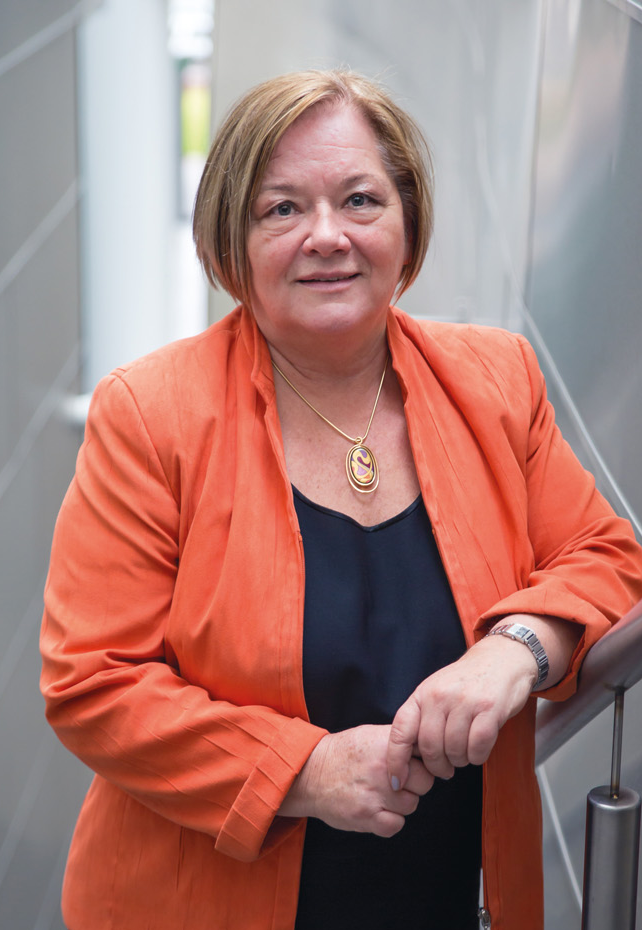
Valéria Csépe
Research Center for Natural Sciences- Hungarian Academy of Sciences
Valéria Csépe, Ph.D. is research Professor at the Research Centre of Natural Sciences (RCNS) of the Hungarian Academy of Sciences (HAS), Professor of Cognitive Psychology and Neuroscience (Technical University of Budapest, University of Pannonia), and member of the Hungarian Academy of Sciences and the Academia Europaea. Her research focuses on the behavioral and brain correlates of typical and atypical cognitive development from infancy to adulthood. The research group of Neurocognitive Development founded by her at the Brain Imaging Centre of RCNS HAS, investigates brain correlates related to the development of spoken and sign language, reading acquisition and disorders, spatial navigation, music as well as executive functions and probabilistic learning with various brain and behavior methods. She served as deputy secretary General of the Hungarian Academy of Sciences, elected for two terms (2008–2014), being the first female in such a high position there. Between 2012 and 2018 she worked for the strategic committee of the International Council of Science (ICSU) as elected member and took part in the preparatory works of the International Science Council (merger of ICSU and ISSC). She is president, appointed in 2016 and 2018, of the Hungarian High Education Accreditation Committee. As of 2017 she is principal investigator of the national curriculum redesign and implementation EU project in Hungary, member of the Education 2030 focus group as well as invited expert of The Research Precariat Scoping Group of the OECD.
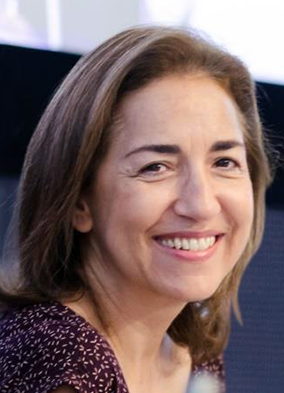
Themis Christophidou
Director-General for Education, Youth, Sport and Culture, European Commission
Themis Christophidou is the Director-General for Education, Youth, Sport and Culture of the European Commission, since March 2018. She is a civil engineer with 33 years of experience in private and public sector management. After having worked in the private sector for 15 years, she joined the European Commission in 2001. Having held various positions in the Directorate-General for Regional and Urban Policy, she worked as Deputy Head of Cabinet of Androulla Vassiliou, Commissioner for Education, Culture, Multilingualism, Youth and Sport in 2010-11. From 2011 to 2014, Themis Christophidou was the Head of Cabinet of Maria Damanaki, Commissioner for Maritime Affairs and Fisheries, and from 2014 to 2018, she was the Head of Cabinet of Christos Stylianides, Commissioner for Humanitarian Aid and Crisis Management. Themis Christophidou is an alumna of the civil engineering faculty of the Metsovio Polytechnic University of Athens, specialised in transport infrastructure and urban transport. Born in Famagusta, Cyprus, she is trilingual Greek, French, English.
Agenda
DAY 1: Thursday Οctober 3, 2019 |
Building | Room | |||||
| 08.30 - 09.00 | Registration | ||||||
| 09.00 - 09.30 | Welcome speech- Introduction to Neo- PRISM-C, the Beneficiaries and ESRs of the project |
Timothy Papadopoulos (Project Coordinator) | Learning Resource Centre UCY Library "Stelios Ioannou" | LRC 014 | |||
| 09.30 - 10.30 | Supervisory Board Meeting | ESRs Meeting |
MBA Building | Department of Psychology | ΟΕΔ0 1 025 | Β122 | |
| 10.30 - 10.45 | Coffee Break | ||||||
| 10.45 - 12.00 | Supervisory Board Meeting | ESRs Meeting |
MBA Building | Department of Psychology | ΟΕΔ0 1 025 | Β122 | |
| 12.00 - 13.00 | Dissertation Writing | Ioannis Tsaousis (UOC) | Learning Resource Centre UCY Library "Stelios Ioannou" | LRC 014 | |||
| 13.00 - 14.00 | Lunch | ||||||
| 14.00 - 15.30 | Neurodevelopmental deficits (NDD) and childhood psychopathology |
Georgia Panayiotou (UCY), Timothy Papadopoulos (UCY) | Learning Resource Centre UCY Library "Stelios Ioannou" | LRC 014 | |||
| 15:30 - 16:30 | Public scientific communication skills (effective presentations) |
Paavo Leppänen (JYU) | Learning Resource Centre UCY Library "Stelios Ioannou" | LRC 014 | |||
| 16.30 - 16.45 | Refreshments | ||||||
| 16.45 - 17.45 | Ethics in doing research with children | Eleni Karayianni (CYPSA) | Learning Resource Centre UCY Library "Stelios Ioannou" | LRC 014 | |||
| 17.45 - 18.00 | Q&A session on Day I | Discussion | Learning Resource Centre UCY Library "Stelios Ioannou" | LRC 014 | |||
| 20.30 | Welcome Cocktail | Paddock Bar – The Landmark Hotel | |||||
DAY 3: Saturday October 5, 2019 |
Building | Room | ||
| 09.30 - 10.00 | Registration | |||
| 10.00 - 11.30 | Workshop on Ethics in doing research with children (GDPR, genetic part, scientific part) |
Christopher Bartlett (NCH) | Learning Resource Centre UCY Library "Stelios Ioannou" | LRC 014 |
| 11.30 - 11.45 | Coffee Break | |||
| 11.45 - 13.00 | Workshop on Brain methods in cognitive neuroscience | Valéria Csépe, Zoltán Vidnyánszky, Ferenc Honbolygó (RCNS-HAS) | Learning Resource Centre UCY Library "Stelios Ioannou" | LRC 014 |
| 13.00 - 14.00 | Lunch | |||
| 14.00 - 15.00 | Modern methods in psychological research | George Sideridis (UOA) | Learning Resource Centre UCY Library "Stelios Ioannou" | LRC 014 |
| 15.00 - 16.00 | Workshop on Modern methods in psychological research |
Ioannis Tsaousis (UOC) | Learning Resource Centre UCY Library "Stelios Ioannou" | LRC 014 |
| 16.00 - 16.15 | Refreshments | |||
| 16.15 - 17.15 | Evidence-based Intervention and Treatment, Basic principles |
Mikko Aro (JYU) | Learning Resource Centre UCY Library "Stelios Ioannou" | LRC 014 |
| 17.15 - 18.15 | Short talks by ESRs on their research plans | ESRs | Learning Resource Centre UCY Library "Stelios Ioannou" | LRC 014 |
| 18.15 - 18.30 | Q&A Session on Day III | Discussion | Learning Resource Centre UCY Library "Stelios Ioannou" | LRC 014 |
DAY 4: Sunday October 6, 2019 |
|
| 08.30 - 16.30 | Optional Excursion to Limassol |
List of Participants
BENEFICIARIES
Prof. Timothy Papadopoulos (Coordinator)
Prof. Georgia Panayiotou
Prof. Marios Avraamides
Dr. George Spanoudis
Center for Applied Neuroscience
Dept. of Psychology
Dr. Kostas Fanti
Dept. of Psychology
University of Cyprus, Cyprus
Prof. Paavo Leppanen
Dept. of Psychology
Prof. Minna Torppa
Dept. of Teacher Education
Prof. Mikko Aro
Dept. of Education
Jyväskylä University, Finland
Prof. Valéria Csépe
Dr. Ferenc Honbolygó
Prof. Zoltán Vidnyánszky
Brain Imaging Center (BIC-HAS)
Research Center for Natural Sciences- Hungarian Academy of Sciences, Hungary
Prof. Olivier Luminet
Psychological Sciences Research Institute-IPSY
Dr. Magali Lahaye
Dept. of Pediatric Hematology and Oncology
Université Catholique de Louvain, Belgium
Dr. Bonnie Auyeung
Dept. of Psychology
University of Edinburgh, United Kingdom
Dr. Yiannis Tsaousis
Dr. Panayiota Dimitropoulou
Department of Psychology
University of Crete, Greece
Dr. George Sideridis
Dept. of Primary Education
University of Athens, Greece
Dr. Kleanthis Neokleous
R&I Department
SilverSky, Cyprus
Dr. Juha-Matti Latvala
Niilo Mäki Institute
Niilo Mäki Foundation, Finland
Dr. Jurgen Tijms
Research & Innovation Division
Regionaal Instituut voor Dyslexie B.V. (RID), Netherlands
PARTNER ORGANISATION
Prof. Christopher Bartlett
Department of Pediatrics
Research Institute at Nationwide Children’s Hospital at the Ohio State University, USA
Dr. Christina Florence Lavallée
Strategic Product Manager
Brain Products GmbH, Germany
Dr. Sam Hutton
European Rep. Office of SR-Research
Mind’s Eye Research Ltd., Sussex Innovation Center, University of Sussex, United Kingdom
Dr. Katarina Pavičić Dokoza
Dr. Maja Kelić
Department of Medical Rehabilitation
SUVAG Polyclinic Zagreb, Croatia
Dr. Eleni Karayianni
Executive Board
Cyprus Psychological Association, Cyprus
Prof. Reinout Wiers
Co-supervision of ESR placed at RBC
Dept. of Dev. Psychology
University of Amsterdam, Netherlands
Prof. Judit Navracsics
Faculty of Modern Philology and Social Sci.
University of Pannonia, Hungary
Accommodation
The Organizing Committee has secured preferential rates for the Conference participants. Book your accommodation at these rates through the online registration system.
- Please note that for a half double room you need to find on your own the other person to share with, and use the shared code provided through the registration page www.easyconferences.org. Both persons must select a half-double room and use the same shared code in their registration.
- The below accommodation rates are per night and are inclusive of V.A.T. Breakfast is included.
- In case you require to extend your stay beyond the booking dates available in the registration system, please contact us at info@easyconferences.eu
The Landmark Hotel – 5*
The Landmark Hotel features a Health Club and fitness
The Landmark hotel boasts several flexible meeting spaces, wireless internet access, a Business Centre and Executive Rooms with Clubroom access. The Hotel features conference services and facilities capable of accommodating up to 1000 delegates.
The Hilton Hotel features the Hiltonia Health Club and fitness
- From the Hotel to City
centre : - From the Hotel to Larnaca International Airport: 45 km, 35 minutes
- From the Hotel to Paphos International Airport: 140 km, 1 hour 35 minutes
- From the Hotel to General Hospital: 2 km, 4 minutes
- From the Hotel to Cyprus Museum: 2 km, 4 minutes
- From the Hotel to the nearest Beach (Larnaca CTO Beach-Cyprus Tourism Organisation):45 km, 35 minutes
- Transportation: City Bus Stop at hotel entrance/ Taxi stop within hotel premises
Rates
Single Room – € 108.00
Double Room – € 130.00
Half Double Room – € 65.00



Semeli – 3*
The newly built (2011) Semeli hotel offers a wide variety of facilities and services created to satisfy every need of either a business or leisure traveller. The name Semeli is derived from the Ancient Greek Mythology, and behind it comes a story of Gods, passion and love. Semeli Hotel is just 45 km from Larnaca International Airport, 145 km from Paphos International Airport and is strategically located only a few minutes away from all the major points of interest in Nicosia. Hotel services: 24 hour Front Desk, multilingual staff, daily press, laundry service, room service, free parking, baggage storage room
The 5 floor hotel offers 58 elegant, spacious rooms, including 50 double rooms, 6 deluxe rooms and 2 suites. Family rooms are also available and can accommodate up to 4 persons. All guest rooms feature Orthopaedic mattresses, Memory Foam Pillow, working desk, direct-dial telephone line, free WI-FI connection, TV and Pay-TV, hairdryer, mini bar, electronic lock system, individually controlled air-conditioning, tea & coffee making facilities, smoke detectors, sprinklers, balcony and safe deposit boxes. Handicap and non-smoking rooms are also available.
The Restaurant offers a high standard service, intending to satisfy our selective guests, offering an exclusive A la Carte selection of international cuisine and a well selected list of superior local and imported wines. A warm and intimate atmosphere, excellent service, and exquisite cuisine is what you will experience when you visit our Restaurant.
The Bar’s private atmosphere and unique design offers all day drinks and early dinner cocktails, a Cognac or a glass of wine. The availability of a projector and a widescreen TV creates the perfect environment for the enjoyment of major sporting and other events. You can relax at the Roof Garden
Semeli hotel features a small area club with Gym and Spa area.
Rates
Single Room – € 85.00
Double Room – € 104.00



Cyprus
An island drenched in sun and mythology, at the crossroads of ancient civilizations. 9,000 years of history gathered together on one island. Cyprus packs a remarkable array of sights and attractions, museums and archaeological parks, throbbing beach resorts, pine covered mountains, medieval fortresses and ancient temples. The remarkably rich legacy in archaeological treasures and highly developed infrastructure, make Cyprus one of the most attractive meeting places of the world.
Travel Information
Geography
Cyprus is the third largest island in the Mediterranean, after Sicily and Sardinia, with an area of 9.251 sq. kms (3.572 sq. miles).
It is situated at the north-eastern corner of the Mediterranean, at a distance of 300 km north of Egypt. The Greek island of Rhodes lies 360 km to the north-west.
Cyprus’ coastal line is indented and rocky in the north with long sandy beaches in the south. The north coastal plain, covered with olive and carob trees, is backed by the steep and narrow Pentadaktylos mountain range of limestone, rising to a height of 1.042 m. In the south, the extensive mountain massif of Troodos, covered with pine, dwarf oak, cypress and cedar, culminates in the peak of Mount Olympus, 1.953 m. above sea level. Between the Troodos range and the Pentadaktylos mountain range lies the fertile plain of Messaoria. Arable land constitutes 46.8 per cent of the total area of the island. Between Troodos range and the Pentadaktylos mountain range lies the fertile plain of Messaoria. Arable land constitutes 46.8 percent of the total area of the island. There are no rivers, only torrents which flow after heavy rain.
History
The history of Cyprus is one of the oldest recorded in the world and its historical significance is disproportionate to its small size. The first signs of civilisation date to the ninth millennium B.C. The earliest known foreign settlements on the island were mainly of Phoenicians and Greeks, with Phoenician culture dominating the island’s eastern and southern parts. As a strategic location in the Middle East, it was subsequently occupied by several major powers, including the empires of the Assyrians, Egyptians, and Persians, from whom the island was seized in 333 BC by Alexander the Great and at which point Greek culture began to dominate. Subsequent rule by Ptolemaic Egypt, the Roman Empire, the Byzantines, Arab caliphates for a short period, the French Luisignan dynasty, and the Venetians, was followed by over three centuries of Ottoman control. Cyprus was placed under British administration in 1878 until it was granted independence in 1960 and since 1974, 33% of the land of Cyprus is occupied by Turkish army.
Cyprus occupies an important role in Greek mythology being the birthplace of Aphrodite and Adonis, and home to King Cinyras, Teucer and Pygmalion.
The island figures prominently in the early history of Christianity, being the first province of Rome to be ruled by a Christian governor in the first century and providing a backdrop for stories in the New Testament.
Demography
The population of the Republic of Cyprus is 952.100 (2012) of whom 681.000 belong to the Greek Cypriot community, (71,5%), 90.100 (9,5%) to the Turkish Cypriot community (estimate) and 181.000 (19,0%) are foreign citizens residing in Cyprus. The language of the Greek Cypriot community is Greek and the community adheres predominantly to the Autocephalous Greek Orthodox Church of Cyprus. The language of the Turkish Cypriot community is Turkish and the members of the community are Sunni Muslims.
Climate
Cyprus has a Mediterranean climate: hot, dry summers from June to September and mild, wet winters from November to March, which are separated by short Autumn and Spring seasons. Sunshine is abundant during the whole year, particularly from April to September when the daily average exceeds eleven hours. Winds are on the whole light to moderate. Gales are very infrequent and heavy storms rare.
Snow hardly falls in the lowlands and on the northern range, but is a frequent feature, every winter on ground above 1.000 metres in the Troodos range. During the coldest months it lies in considerable depth for several weeks, attracting skiers.
Food and Drink
The food of Cyprus reflects the rich and turbulent history of the island and its indelible Greek culture. You will find tastes influenced by the Middle East, Asia Minor and the Venetians, all using fresh local ingredients, herbs and spices and olive oil. The Mediterranean diet, with its grains and pulses, sun-ripened fresh fruit and vegetables, high-protein fish, lean meat and poultry and wine, is a healthy option.
Cyprus has a long tradition in winemaking that goes back over 4,000 years. In ancient times wine was a major source of wealth for the island. The island supplied the Pharaohs of Egypt and Cyprus wines were in great demand amongst the ancient Greeks and Romans.
Commandaria is acknowledged to be the oldest wine in the world and was probably the first to be given an ‘Appellation d’Origin’(label of geographical origin). Legend says that Commandaria was originally made for Richard the Lionheart and the Crusaders. The dessert wine, which has a taste like sweet sherry, has been made using the same method for hundreds of years. The grapes are picked late, dried in the sun to enhance their sugar content and then pressed. The run-off is collected and fermented in tanks or in huge earthen ware jars. The sweet wine of Cyprus became known throughout Europe under the name Commandaria depicting its geographical origin “Commandarie” which was the name given to the land owned by the Knights Templar and later the Knights of St. John.
More general information about Cyprus can be found on the FAQ page of this website and detailed information at www.aboutcyprus.org.cy.
Nicosia is the capital of Cyprus; a status it has enjoyed for 1000 years since the 10th century, though its beginnings date back 5000 years to the Bronze Age. It lies roughly in the centre of the island in the Mesaoria Plain, flanked by the beautiful northern range of Kyrenia Mountains with its distinctive ‘Pentadaktylos’ – the five finger mountain. There are various suggestions as to the origin of the name Nicosia – or ‘Lefkosia’ In Greek – but the most likely one is linked to the popular tree, the tall ‘Lefki ‘ which once adorned the city.
Based in Nicosia are the Government head offices, Diplomatic headquarters and the cultural centre of Cyprus. The capital presents two distinct faces: the old, original part of the city, surrounded by sturdy Venetian walls over 400 years old, and a busy modern metropolis which has a population of 171.000 together with the suburbs.
Within the large area, encircled by the strong bastion walls that served to protect the town for centuries, are many places of great historic interest.
The central Eleftheria Square links old Nicosia with the elegant modern city that has flourished outside the walls, where hotels, offices restaurants and gardens blend happily with the fine old houses and colonial buildings of this cosmopolitan city.
Nicosia is a sophisticated and cosmopolitan city, rich in history and culture that combines its historic past with the amenities of a modern city. Nicosia has established itself as the island’s financial capital and its main international business centre. The ‘new’ Nicosia developed outside the walls became a contemporary, business and cultural center. Just a few miles away are enchanting places of interest such as Byzantine churches and monasteries, archaeological sites and charming villages. The uniqueness of such a combination makes the capital of Cyprus a place worth knowing and certainly a place worth visiting!
Private Taxi Transfers
Arrange for transfers by taxi through the conference coordinator, EasyConferences. These transfers are bookable online through www.easyconferences.org. These transfers can be private (max 3 persons) or shared, are inclusive of meet and assist, and the service is guaranteed.
Note: There will be a person waiting for you after Customs Formalities with a sign stating the conference name. You simply need to tell your name to the taxi driver, so that he can escort you to your taxi for you trip to your hotel.
How to meet your driver
Larnaca Airport Arrivals
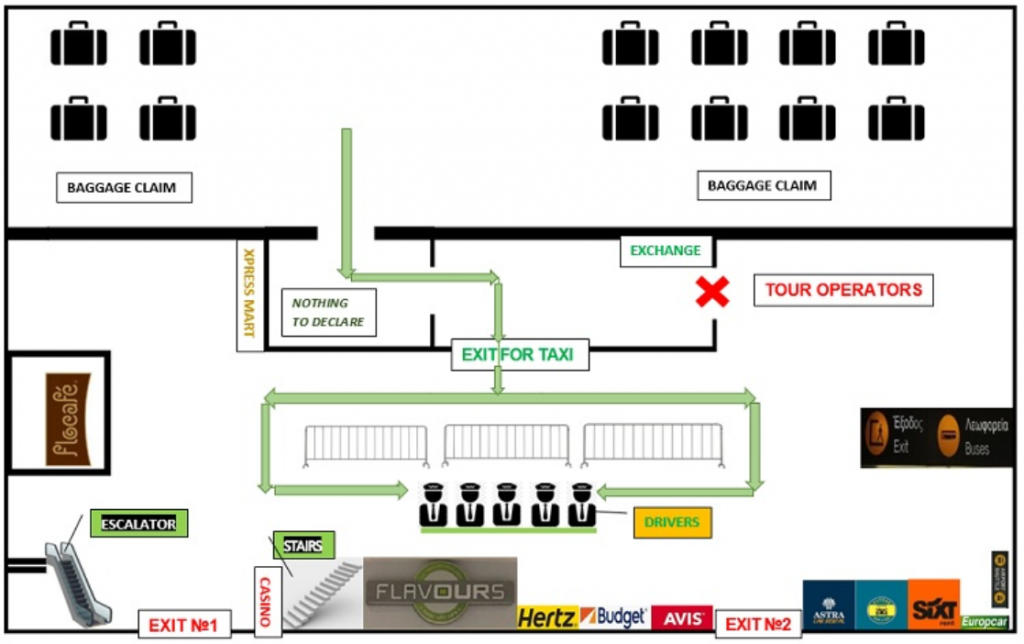
Paphos Airport Arrivals

Reminder: You should apply for a visa in good time, in case of any delays during processing.
If you require a visa invitation or confirmation letter, please email us at info@easyconferences.eu.
Important note for travellers
As Cyprus is a candidate country bound to join the Schengen Area, Residents of non-EU countries who hold valid multiple-entry Schengen visas must first pass through a full Schengen member territory in order to utilize the visa in Cyprus. The Schengen Visa holder is allowed to travel to Cyprus directly from a Schengen member country without applying for a National Cypriot visa and stay in the Republic of Cyprus for the duration of their Schengen visa.
The above arrangements do not apply for persons holding a Turkish or Azerbaijani passport. If you are affected, please visit the Cyprus Ministry of Foreign Affairs website on how to apply for a Cyprus Visa.
For further information, please check the European Commission website regarding Schengen Visas.
Schengen Area as of 1/7/2013
Where Visas are being issued
Visas will be issued by all the Diplomatic Missions (Embassies and General Consulates) of the Republic of Cyprus, and by all the Honorary Consulates of the Republic of Cyprus abroad in their respective countries.
ARGENTINE REPUBLIC, BAHREIN, HONG KONG, JAPAN, JORDAN, KAZAKHSTAN, KUWAIT, OMAN, SWITZERLAND, SUDAN, UNITED ARAB EMIRATES (ABU DHABI, DUBAI) and UZBEKISTAN.
For the latest information please visit the Ministry of Foreign Affairs website.
Your content goes here. Edit or remove this text inline or in the module Content settings. You can also style every aspect of this content in the module Design settings and even apply custom CSS to this text in the module Advanced settings.
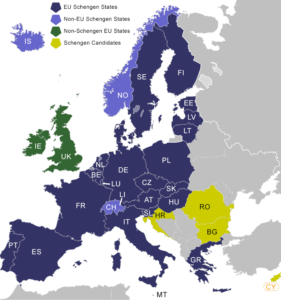
Book your flights to the “Neo-Prism-C” online at www.austrian.com and save 15% on all applicable fares!
To do so, simply enter the following code in the eVoucher field on the Austrian homepage booking engine:
Code: TBA 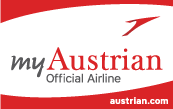
Conditions:
- Booking period: now until TBA
- Valid for flights to Larnaca via Vienna and return TBA until TBA, 2019 (final date for return flight) on scheduled flights operated by Austrian Airlines
Book your flights here!
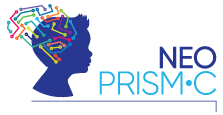

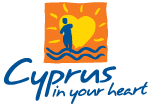
Social Events
Welcome Cocktail
Date: Thursday Oct 03, 2019
Time: 20:30
Place: Paddock Bar – The Landmark Hotel
The Welcome Cocktail is the first social gathering between all delegates and it will take place at the Landmark Hotel. It will be a relaxing evening during which you will have the opportunity to talk to colleagues and peers, while enjoying local drinks and ample canapés.
Tour with Dinner
Date: Friday Oct 4, 2019
Time: 19:30
Place: Stoa tou Dimitri (“Στοά του Δημήτρη”)
Buses for the tour will depart at 19:30 to pick up participants from The Landmark and Semeli hotels. Participants will enjoy a driving and walking tour in the city centre accompanied by a professional guide. The tour will end at “Stoa tou Demetri” in the old city of Nicosia. Dinner will consist of an array of traditional dishes complimented with local drinks and desserts.
Click here to view the location
Optional Excursion to Limassol
Date: Sunday Oct 6, 2019
Departure Time: 08:30 – 16:30
Price: 40.00 euros per person
Full Day Excursion is inclusive of transfers by luxurious fully air-conditioned coach, licensed guide, all entrance fees, taxes and VAT(19%).
Minimum participation: 15 persons is required. If excursion will not be materialized due to low participation, then participants that had originally booked and paid for the excursion, will be fully reimbursed.
Click here for the full description of the excursion.